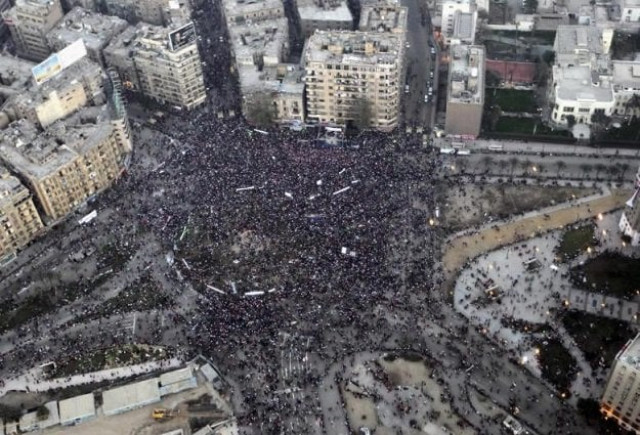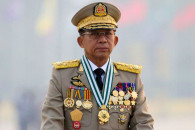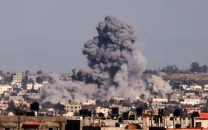Egypt since its revolution six years ago
On January 25, 2011, massive anti-Mubarak protests erupt after a revolt topples Tunisia's ruler

An aerial view made from an Egyptian army helicopter shows a general view of supporters of Egypt's army and police gathering at Tahrir Square in Cairo, on the third anniversary of Egypt's uprising, January 25, 2014. Twenty-nine people were killed during anti-government marches on Saturday while thousands rallied in support of the army-led authorities, underlining Egypt's volatile political fissures three years after the fall of autocrat President Hosni Mubarak. Security forces lobbed teargas and some fired automatic weapons in the air to try to prevent demonstrators opposed to the government reaching Tahrir Square, the symbolic heart of the 2011 uprising that toppled the former air force commander. PHOTO: REUTERS
On January 25, 2011, massive anti-Mubarak protests erupt after a revolt topples Tunisia's ruler in what becomes known as the Arab Spring. On February 1, more than one million demonstrators take to the streets of Egypt, with a great flood of people congregating in Cairo's Tahrir Square. On February 11, Mubarak resigns and hands power to the army, which suspends the constitution and dissolves parliament.
Egypt court overturns death sentence against former president Mohamed Mursi
About 850 people die in clashes with security forces during 18 days of revolt. From November 2011 to January 2012, Egypt holds post-revolt parliamentary elections. Islamic Political parties win about two-thirds of the seats, half of which go to the Muslim Brotherhood.
In June, parliament is dissolved when a court rules it is illegal. On June 30, 2012, Brotherhood candidate Mohamed Morsi is elected president with 51.7 percent of the vote. He becomes Egypt's first freely-elected civilian and Islamic leader.
In August, Morsi replaces Defence Minister Hussein Tantawi with military intelligence chief Abdel Fattah al-Sisi. On July 3, 2013, Sisi ousts Morsi after massive protests against his one-year rule and freezes the Islamic-drafted constitution. Morsi denounces a "coup" as authorities launch a crackdown against his supporters.
On August 14, security forces move against two pro-Morsi protest camps in Cairo, killing at least 700 people. Since Morsi's removal, at least 1,400 people have been killed in a police crackdown on protests, mostly militants.
Tens of thousands of Morsi's supporters have been arrested and hundreds, including Morsi himself, sentenced to death. In December, the government declares the Brotherhood a "terrorist" organisation. On June 8, Sisi is sworn in as president having won 96.9 per cent of a vote boycotted by the Brotherhood and secular dissidents.
In late 2015, a new parliament dominated by supporters of Sisi is elected. On February 10, 2015, during a visit to Cairo by Russian President Vladimir Putin, Cairo and Moscow agree to jointly build Egypt's first nuclear power plant. On February 16, Cairo carries out air strikes against the Islamic State (IS)militant group in neighbouring Libya after a graphic video is released showing the beheading there of 21 Christians, almost all Egyptian Copts.
On October 31, a Russian passenger plane blows up in the Sinai, killing all 224 people on board. IS says it smuggled a bomb on board, while Moscow says an investigation has found that the plane was brought down by a bomb. The militant group's Egyptian affiliate, which operates mostly in the north of the Sinai Peninsula, has killed hundreds of policemen and soldiers.
Egypt gives life sentences to Brotherhood supporters for 2013 riot
On December 16, Saudi Arabia pledges a total of $8 billion in investment and aid to Egypt, along with petrol supplies, over the next five years. On January 10, 2016, Egypt's new parliament convenes in its first session since the legislature was dissolved in 2012, after a legislative election dominated by pro-government candidates in the absence of any opposition.
On November 3, Egypt's central bank floats the currency, leading to a sharp devaluation of the pound against the US dollar. The move comes amid economic reforms to meet conditions for Egypt to obtain a $12-billion loan from the International Monetary Fund.
On November 12, the IMF approves the loan.



















COMMENTS
Comments are moderated and generally will be posted if they are on-topic and not abusive.
For more information, please see our Comments FAQ